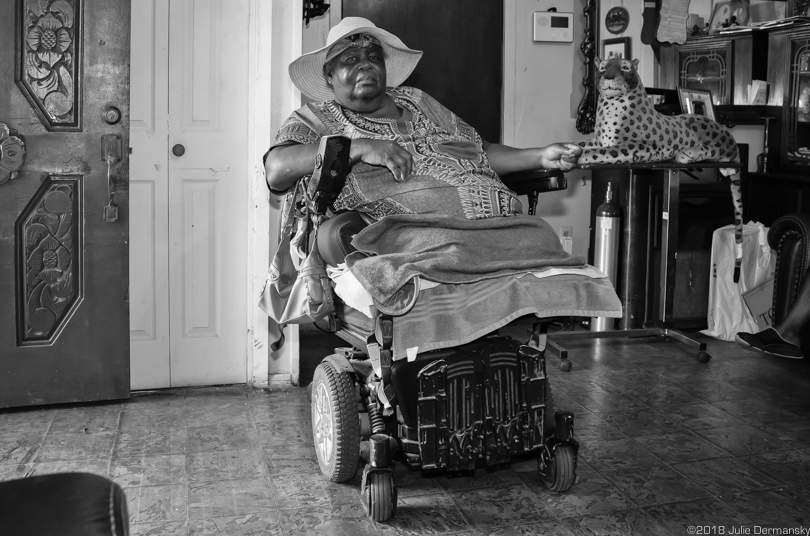
Did you know that Truthout is a nonprofit and independently funded by readers like you? If you value what we do, please support our work with a donation.
Sharon Lavigne and Geraldine Mayho took me to meet some of the most vulnerable members of their community, handicapped residents of St. James, Louisiana, who live near a terminal where the Bayou Bridge pipeline will end. “These people have no way of getting out if there is a spill or explosion,” Lavigne told me. She explained with only one road in and out of the area, if the pipeline fails or an industrial accident occurs, “we are all trapped back here.”
St. James is a predominantly low-income, African-American town of less than 1,000. It is located in the middle of a highly industrialized stretch of land along the Mississippi River, between Baton Rouge and New Orleans, known as Cancer Alley. The town is part of St. James Parish’s 5th District, an area that has transformed from mostly rural to industrial over the last decade.
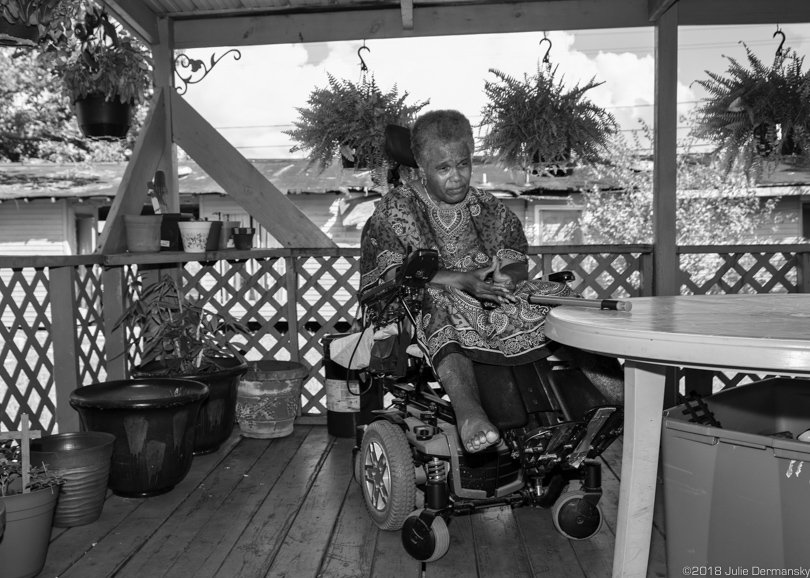
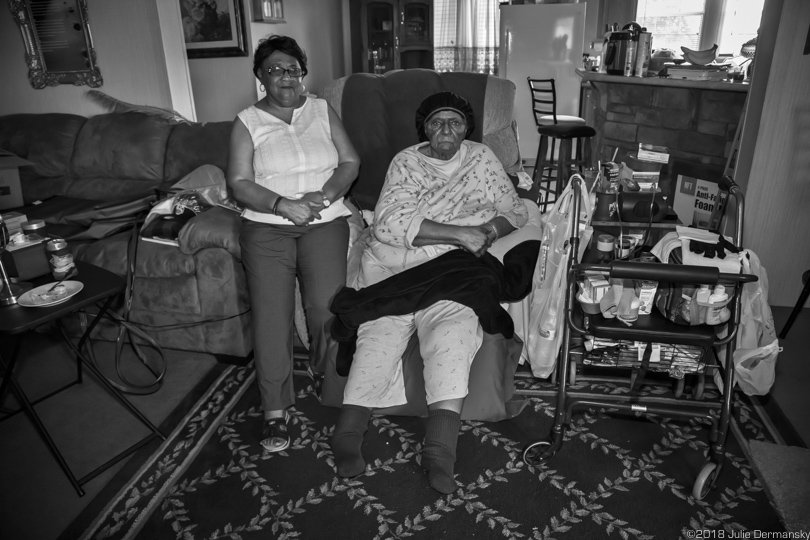
Numerous industrial projects including the Bayou Bridge pipeline currently are being built here.
The Louisiana governor’s office recently announced the Taiwan- based Formosa Petrochemical Corp. purchased a 2,400-acre site along the west bank of the Mississippi River near the Sunshine Bridge, at the district’s edge. The company plans to build a $9.4 billion chemical manufacturing complex that it is branding as “the Sunshine Project.”
But Lavigne and Mayho see it as one more nail in their coffins because they don’t believe a chemical manufacturing complex can operate so closely to their homes without adding to the air pollution their community already endures.
The new industrial facilities and infrastructure like the Bayou Bridge pipeline will join a large number of oil storage tanks that were built close to many homes on St. James’ Burton Lane, where I visited and shot portraits of some of the residents with restricted mobility.
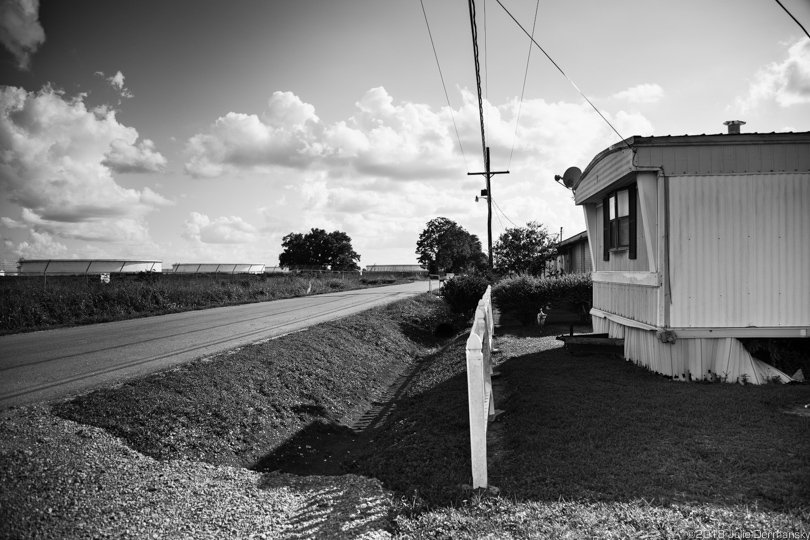
Oil Pipeline Pushback
Lavigne and Mayho are members of the Humanitarian Enterprise of Loving People (H.E.L.P), an organization of concerned citizens who have been pushing for an emergency evacuation route from their community to be established. The group also has been resisting the influx of industrial projects being built near their homes.
Members of HELP, including Pastor Harry Joseph of the Mt. Triumph Baptist Church, learned about the proposed 162.5 mile Bayou Bridge pipeline in January of 2017 from Louisiana-based environmental groups opposed to it and joined the fight to stop it. The oil pipeline, a joint venture between Energy Transfer Partners and Phillips 66, is being built across southern Louisiana from Lake Charles near the Texas border to a railway terminal in St. James.
Before the end of 2017, the Bayou Bridge pipeline received all the necessary state and federal permits and Energy Transfer Partners began construction, despite legal challenges at both the state and federal level. Earthjustice, an environmental nonprofit law firm, filed a lawsuit challenging a portion of a US Army Corps of Engineers permit issued for the Atchafalaya Basin, an environmentally sensitive river swamp that is a National Heritage Area and habitat for wild crawfish.
The Tulane Environmental Law Clinic filed the state case on behalf of H.E.L.P and two environmental groups, the Gulf Restoration Network and Atchafalaya Basinkeeper, against the Louisiana Department of Natural Resources (DNR). This lawsuit questions the legality of a state coastal zone permit for the last 18 miles of the pipeline, where it ends in St. James. A state court agreed DNR did not follow state guidelines and issued the permit despite the project’s lack of adequate environmental and emergency response plans for St. James in case of pipeline failure, but the agency is appealing.
While pipeline opponents won initial victories at the state and federal level, construction has continued, and the legal battles have too. Bayou Bridge LLC expects the work to be complete by October 2018, which could be before either case is heard in court.
State Court Ruling Disappoints St. James
“We were so happy when we heard the judge ruled in our favor,” Lavigne said, but that feeling dissipated quickly.
Judge Alvin Turner, Jr.’s April 30 ruling stated DNR could not issue a permit until St. James was provided an emergency evacuation plan. His decision in essence invalidated the permit but didn’t legally compel DNR, which is appealing, to stop the construction already underway.
Lisa Jordan of Tulane Environmental Law Clinic thought the ruling called for the work to stop because it stated the coastal zone permit couldn’t be issued until an evacuation plan was created. But DNR doesn’t agree. According to DNR, the ongoing work in the coastal zone is still permissible until after its legal appeal.
Jordan challenged DNR’s position, alleging that the agency was in contempt of court for not stopping the work until the appeal is heard unless an evacuation plan is created.
Judge Turner, who ruled in the community’s favor, was scheduled on July 3 to hear Jordan’s arguments about why DNR should stop construction during the appeals process, but the hearing was canceled. Jordan said, “It was explained to me that Turner no longer had standing as the case had been transferred to the appellate court.”
“I’m very disappointed in Judge Turner. I thought he cared about this community and was going to be our savior,” Lavigne said. She is also disappointed that DNR would allow pipeline construction to continue unabated during the appeal.
Jordan hasn’t lost faith that the lawsuit will result in an evacuation plan for the community, even though the pipeline will likely be finished before DNR’s appeal plays out. “If we win, DNR will be responsible to make sure an evacuation route is created,” she said.
Lavigne isn’t very hopeful at this point. “The people making decisions for us only care about money,” she said. Lavigne doesn’t believe anything will change until after there is a disaster of some kind in the community.
UPDATE 7/13/18: On July 13, Jordan filed a motion asking the appellate court to expedite the appeals process for DNR.
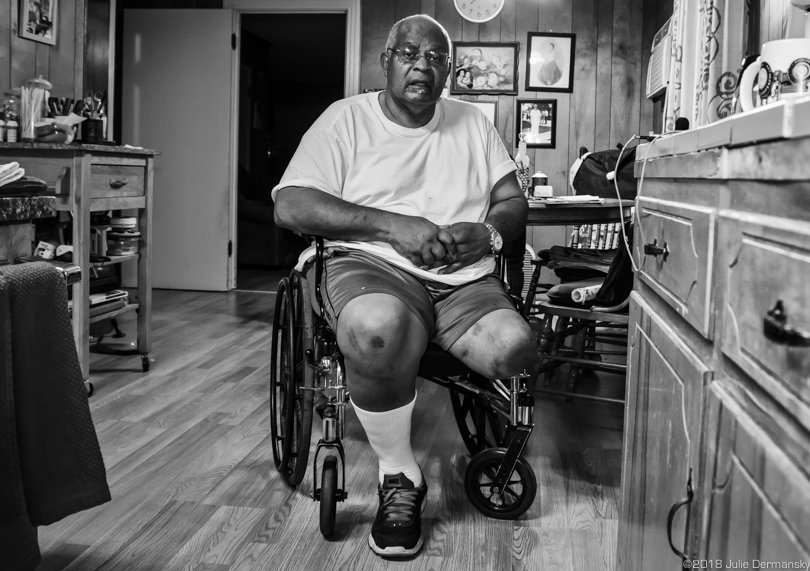
A terrifying moment. We appeal for your support.
In the last weeks, we have witnessed an authoritarian assault on communities in Minnesota and across the nation.
The need for truthful, grassroots reporting is urgent at this cataclysmic historical moment. Yet, Trump-aligned billionaires and other allies have taken over many legacy media outlets — the culmination of a decades-long campaign to place control of the narrative into the hands of the political right.
We refuse to let Trump’s blatant propaganda machine go unchecked. Untethered to corporate ownership or advertisers, Truthout remains fearless in our reporting and our determination to use journalism as a tool for justice.
But we need your help just to fund our basic expenses. Over 80 percent of Truthout’s funding comes from small individual donations from our community of readers, and over a third of our total budget is supported by recurring monthly donors.
Truthout has launched a fundraiser to add 460 new monthly donors in the next 8 days. Whether you can make a small monthly donation or a larger one-time gift, Truthout only works with your support.